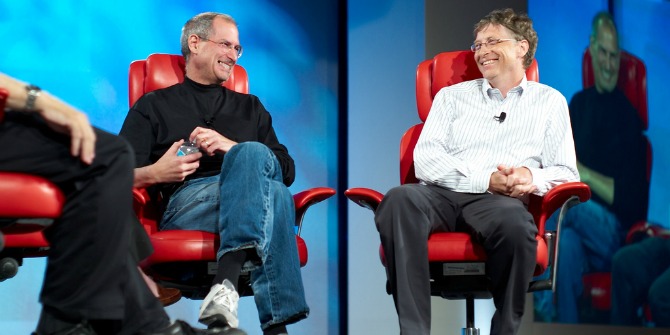I remember a pivotal moment in Deewar, one of the biggest Bollywood blockbusters of the 1970s, when Bollywood still had the courage to make movies about exploited industrial workers. Amitabh Bachchan, India’s biggest ever star and angry young man of the day, having decided to make big money at any cost in revenge against a rich man and his troubled younger days, challenges his goody two-shoes cop younger brother: “ Today, I have a big house, a big car, a bank balance, property…what do you have?” The younger brother replies: “I have mother”. That’s the day the elder brother changes. For good.
Replace mother with humanity and earth (and what better metaphor could there be?) In an admittedly convoluted way, we, the well off, have our challenge today and the billionaires have the biggest challenge and opportunity of all. There are more than 2,000 billionaires in the B-club, which holds more than US$9 trillion in wealth, with the richest man alone having a net worth of more than US$100 billion. They may have lost a few billions in the past few weeks, but I doubt any of them is losing sleep over it, though some may be facing the dreadful prospect of being relegated from the Premier League.
Seventy-eight of the B-club’s members are in Forbes’ latest list of billionaires taking significant action about the Covid-19 crisis. That’s brilliant. However, even of these 78, only a handful seem to be donating amounts above USD10m. Personally, I had hoped these numbers to be in the billions too. They would still be left with billions.
One could argue that, after all, it’s their personal wealth, created from completely legal means, and it’s their right to do what they want with their money. However, this wealth was not created in a vacuum; it was and is being earned from the rest of the humanity and nature’s bounty. So the question is what, when and how much should they be doing?
To balance my left-of-centre bias, I asked more than a hundred friends this same question. Most of them are successful corporate executives, businessmen and elite professors. I expected many of them to shut me up, arguing this to be a role of the government. However, I was (pleasantly) surprised that even the staunch capitalists among them wanted more and better from the B-club. Here are a few themes:
Most of us are expecting the B-club to do more and better. What better time than NOW to build legacy?
Almost everyone expects the billionaires to do much, much more, especially for the bottom of the income pyramid. It was heartening to see that even those among my friends who in the past had used ‘survival of the fittest’ and ‘eventual trickle down’ capitalist arguments were now completely sympathetic. Crises do bring out the best in humans. The B-club has the smarts and resources to make a much bigger and sustained/sustainable difference.
They should focus on the tactical for now, as some of them are doing, but do much more and join forces for massive global impact.
With their expertise, efficiency and speed of action, they can do amazing urgent and tactical work without waiting for government intervention and support:
a) Be a role model of courage, positivity and largesse. It surprised me that even the best of us need them as role models but they do and therefore I suspect millions of people in the world do too.
b) Provide immediate direct assistance to the vulnerable through food, tests, cash grants and salary guarantees, including billions of contract workers, daily wagers, marginal farmers and gig economy workers that many new business models have created.
c) Retain employees and encourage/incentivise their supply chains to do the same. After all, every formal and informal worker toils to contribute to their business/brand. Maybe the owners/senior executives can take a pay cut for a year or two to retain the lower end of the staff. This will ultimately also help businesses serve customers much better; in my opinion, banks that cut too deep during the 2008 crisis ended up creating a much worse customer experience.
d) Invest in research for a Covid-19 vaccine, ventilators, clinical trials, etc, without holding intellectual property. This is not the time to hold on to secrets to maximise profits. Create global partnerships, including poorer countries where people will not be able to pay western prices.
e) Join/form working groups with governments to genuinely help them create more effective schemes and implement them better. For instance, fast-moving consumer goods companies could use their effective distribution arm for masks, sanitisers, medication and even information in every village in the world.
f) No bonus for senior staff in 2020. Take maximising profit out of the equation for a year.
g) Put aside a significant sum of money to kickstart the economy when the current problem subsides.
h) And, finally, combine their strengths in large coordinated international groups to tackle this global crisis. That will need leadership and management of egos, but they have the leaders among them to be able to do this.
And then move to strategies to change the world for the better
a) People: Influence public policy not only for businesses, but also for systemic improvements in the wellbeing of the people, especially at the bottom of the pyramid. Trickle down is too slow and has not been working well for decades. Address the problem of why some of the most important jobs like teachers, nurses and social workers are so low paid compared to, say, bankers or computer programmers. This may involve sacrifice at the top of the pyramid.
b) Environment: Manufacturing and services supply chains have generated large employment. But they have also created large pools of human and environmental degradation to cut costs to provide cheaper products and services. When these supply chains come back to production, start with the improvements needed. Communicate now.
c) The measure of success: It is time to push the GDP question mainstream in business and in governments, with B-club leadership. We can’t keep running the world to maximise consumption at the cost of environment and humans.
When I was growing up, my mother used to sing a song that roughly translates to “if you remember God in your good times, you won’t have bad times”. To me it means: why is it that people don’t think of these solutions when things aren’t so bad? If the powerful and influential were always doing the right thing for the bottom of the pyramid and the environment, we wouldn’t have poverty and environmental crises of this proportion. Would it be such a bad thing if we had fewer billionaires but a happier, healthier world!
♣♣♣
Notes:
- This blog post expresses the views of its author(s), not the position of LSE Business Review or the London School of Economics.
- Featured image by Nathan Dumlao on Unsplash
- When you leave a comment, you’re agreeing to our Comment Policy






Excellent article with some very specific and practical steps for the billionaires to adopt ! Sadly (because its not been), many of these suggestions should be done even when there is not a crisis at hand. But lets hope this situation forces the really rich to think above what they have, how it might have been created, what they really need – and share with those who have not been as fortunate (and at least with the employees / supply chain of their own companies).
Rajnish. All hope is not lost. It made an extremely generous person like you give back even more today:-) I hope these billionaires follow your example. With blessings of Indian worker community. Sandeep
An excellent article – thought-provoking and sensible. It begs the question why can’t suggestions such as Sandeep’s be mandated in the corporate world?
The cycle of life has historically suggested that good times follow the bad – so one hopes our corporates make better use of the good times we may see next !
Sriram. Thats exactly right. Corporate world professionals are driven by a single aim in most cases – maximise profits at any cost. Rarely are real cost of externalities woven into business case calculations. I have done that myself in my previous life. For 22 years of high flying corporate career. no board even asked me about these costs or if they did, it was with a wink. So who will mandate this to corporates? there are only two other players who can do that – government or people (though they should be on the same side, they are not sadly in most circumstances as GDP takes over human/environment costs). One day…:)
Very comprehensive and insightful. I would add one more long-term goal – to build quality educational institutions with curricula that focus strongly on ecological, environmental and humanitarian causes. Our hope lies with the next generation. If we make them understand and live the concept of Vasudhaiva Kutumbakam, then the future is secure. If they grow up as individualistic as us, with their concept of success being defined in terms of bank balances and the size of their homes and cars, then Planet Earth is in some serious trouble! I do hope to see some of those billions used for this awareness-building.
Kalpana. What a great idea. Indeed, our education system needs to bring in far more values. You remember, growing up in India, we had a subject Moral Science. It made little difference to our generation and we took decisions in our roles that did not help matters. We need our children to be exposed to reality of bottom of the pyramid and environmental degradation and we need to make some sacrifices too to set an example. They will learn as much from us.
Interesting! I like the point about industrialists finding ways to keep on workers and to provide them with livelihoods – this is not only the right thing to do, but could allow the economy to spring back to action quicker when the time comes. But is this list of suggestions either-or? Billionaires can do this without waiting for governments, sure, but can government policy and the world’s super rich work together? We have all been talking about mobilising private sector financing for development, but that’s being done not in a haphazard way, but as part of policy. The world’s best minds need to work together, private or public.
Paulina. Thats indeed a big question. Why don’t they work together to resolve these issues?
They do work together when it comes to maximising corporate growth and profits (which in many cases, not always, means more employment, though even that is now a days often not quality employment but contract workers/gig economy).
is it possible without changing the expectations from the governments?
Thanks for the response Sandeep. Actually I have a question, those 78 billionaires you mention, what do they donate for? What do they do, and do they follow any of the steps you write about? Are they more focused on buying supplies or creating systems/working out longer-term solutions?
Hi Paulina. There is a whole range of their actions and some covering the short term ideas here but mostly around provision of immediate needs. What is missing most is the scale of their individual response compared to their resources, sacrifices like no bonus, or no patents, and a coordinated response among them. What is completely missing are the big strategic systemic changes proposed. Personally, I would rate their response on the ideas in this blog as 1/10!
Great piece, and I agree with everything you’ve suggested. I wish, though, that we didn’t have to wait for and rely on the ‘voluntary goodness of the billionaires’. At times like this, it would be beneficial to have a systematic way of asking – and designing a programme or an initiative that could invite and utilise their funds, across the globe. Often times, people don’t know how to help – and here, I am giving people the benefit of doubt.
I also wish there was a magic wand that measured ‘enough’. There isn’t an end to maximisers – of all kinds – but I read many years ago, that one must give till it pinches… so while there is an important call of action to the world’s billionaires, I believe the framework applies to each one of us who technically has ‘enough’.
Lastly, please find a way to popularise this piece – it might hit a chord right now. A few months down, given how short public memory is, it will likely not.
Thanks Sandeep for a very thoughtful and timely piece.
Anuradha. Great points!
1. Good thought about creating a mechanism to achieve this. Something to think hard about. Who can convince them to come together to achieve even some of this?! Hmm…Food for thought.
2. ‘Enough’:-) Now thats almost a philosophical question and apart from spiritual masters of the world, no leader of today talks about or leads that life. We need heroes. May be a billionaire here will give up all for these causes and show others. I find more such heroes in common men and women in social sector than in business but I may be wrong.
3. Popularise the piece? Not my strength but will try. Do help by spreading the message to billionaires and indeed millionaires you know:-)
Well written article Sandeep and I totally agree with you My question is what do we need to do to make this a reality? Should we be Democratic and ask the B-club to do the necessary? Or should there be an Authoritarian body which demands this be compulsory? Or are we going to guilt shame these people? After all it is GREED which has brought us to this point. Is it going to vanish so easily? I really don’t have any answers to my own questions except to say that I commit to doing what I can and I can see many others doing it too. There is HOPE; humanity and humaneness still do exist. I CHOOSE to believe that. Otherwise this world becomes too harsh a place to live in. You have set up some v good guidelines here. I am sure it will have an impact.
Teeny. Thats it! You lead by setting an example and let these billionaires follow your lead. Greed is now a virtue we unknowingly teach our future generations through what we say, do, heroes they have (no Martin Luther King, Gandhi now a days) and business models we create. Professionalism is now becoming an intelligent and robust cog in the greed driven business models; ethical values are not really part of professionalism apart from forced compliance by governments. So if professionals are not going to answer these, then it will have to be governments but why would they? Is public demanding it enough!
Well said. Billionaires have to give in Billons. They will still be billionaires. Besides where will they go with the money or what will they do with the money if they don’t have a wonderful world to live in.
A very insightful piece Sandeep. You echo my thoughts through this article. I have always been very concerned about the growing income disparities that we see, particularly in India. In corporates, there is such a wide and appalling gap in the salaries of the CEO and those at the bottom of the pyramid.
Considering that the survival mindset is so strong for us given our collective conditioning, giving doesn’t come easily.. This is not just for billionaires but also for many of us who are privileged to have a more than comfortable lifestyle. Giving needs to be 2 fold- money and time. Both are essential for equitable distribution of wealth, resources and for building a more humane compassionate society. I wonder if this was mandated as a policy it would be seen as an infringement of an individual’s right to freedom and choice?
Thanks Aparna. I agree completely. We all need to step up! In the past three days, two donors have doubled up their donations to us at http://www.safeinindia.org as they decided after reading the blog that they need to do more.
Your about giving time is even more important. There is so much of corporate sector expertise needed in the solutioning the social issues. The NGOs are too sub-scale mostly and the new social enterprise sector still too small and also struggling with scale. if only more corporate-experienced people jumped in with their time, we could do so much more.
Individualism in my personal current view has gone too far in some areas. But thats another piece:-)
Sandeep, you have articulated the possibilities of how this great deal of resources (concentrated into the hands of a few) may be mobilized in times of this crisis. Its quite clear that this specific ‘disease’ does not discriminate between the rich and poor. Because those that do discriminate and are more widely spread and damaging are not considered serious enough. So the billionaires should be worries a little more now. After all without all this underpaid workforce how would they maintain and grow this ‘wealth’? I am not sorry for sounding cynical here because I think unless this crisis were to present an opportunity to profit, the billionaires will be doing the same thing as always – paying off just enough to keep their distance from any sort of serious structural change that attacks inequality.
Thanks Navdeep. Thats a fair challenge to the billionaires to set an example. if they don’t step up the game much more, given that even capitalist governments known for their hard conservative policy designs have suddenly turned socialist in action (forced to in fact), they may have to deal with a much worse public opinion and cash strapped governments desperate to tax the rich.
Great article Sandeep – thank you! I am hoping that this crisis might finally hammer home the message that we are all in this together. The rich have long been able to shield themselves from social impact of inequality, but in this crisis everyone depends on the work of low-paid care workers, nurses, refuse collectors. Meanwhile, here in the UK homeless people on the street are final deemed a social problem worthy of action. So let’s hope your call is heeded. My only worry is that big philanthropic gestures are too often used to disguise massive tax avoidance. The other message of the Covid crisis is that we need a functioning state and well-funded public services, which have to be funded by taxation.
Hi Sarah. Couldn’t agree more! Higher taxes for sure are coming and sadly they may have to now be spent on recovering from the economic damage of COVID19 rather than systemic improvements in the lives of the poor. I worry that things will actually get worse for them in the foreseeable future. The only people with cash would be the rich for a year or two, so lets hope they are honest, sincere and impactful dealing with real systemic issues!
Thoughtful. Practical. Comprehensive. We need to spread this word faster and further. It is going to be difficult with everyone in lockdown and flooding the social media airwaves with a variety of babble – admittedly some of it interesting and/or amusing (also needed at this unusual time!). But this is a piece we need to send to thinkers, educators, policy makers, politicians over and over until there is some change. Clearly we cannot go back to the same way of thinking and doing.
This is well put together but then, I expect no less from my bright and practical colleague Sandeep..We are in for the long haul with this crisis and some redistribution of wealth has to happen to stabilise the world.
A very cogently argued and timely appeal to the super rich with an eminently pragmatic action plan. I would suggest that its ambit should be expanded to include rupee billionaires as well. They certainly are super rich by Indian standards!
Kamal Jaswal
Kamal Ji – thats a great point. We should do something about that too. The increasing inequality in India and concentration of wealth in fewer hands does need addressing!
What if we made maximisation of Gross National Happiness the central objective of Governments and Society. How would that change things? I read somewhere that when Warren Buffet made 10 million USD he had reached the maximum that was required to maintain his happiness. After that other resources were bounding constraints in maximising his happiness. Maximising happiness would mean making sure that every human being has access to a good life and to opportunity. This becomes mandatory. Everything else has to follow. In this system, the taxing of billionaires is not unusual but a natural consequence of our objective.